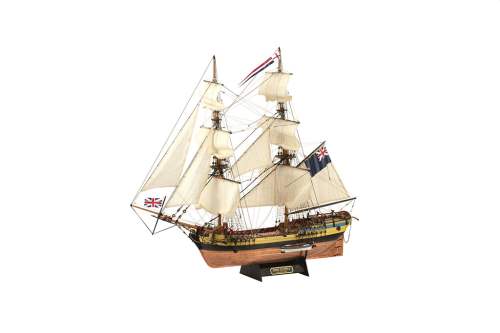Artesania Latina HMS Supply First Fleet + Figurines
RRP 250.00 You Save £25
Artesania Latina HMS Supply First Fleet + Figurines
This redesigned naval modeling kit with the HMS Supply model ship contains high quality parts. 6 wooden plates cut by high precision laser, 2 photo-etched plates in brass with numerous details -one of them smaller-, set of birch wood parts -veneers, strips and round rods-, oak wood veneer, fantastic set of 11 cotton sails sewn and ready to be placed, cotton threads for rigging in different colors and thicknesses and flags.
As for the fittings, the HMS Supply box comes with thread and brass rods, nails, eyebolts, rings, chain, aluminum parts, die cast parts -anchors, oars, belaying pins, cannons, water pumps, wooden parts -blocks, frames and deadeyes-, turned parts and acetate.
For its assembly, you can follow our complete step-by-step guide entirely on video - very easy to follow - which you can view for free at our Youtube channel -click here-. To do this, you can also scan the existing QR code on the box and the parts list. It will be like a masterclass carried out by our professional modelers. The kit does not contain printed instructions. The color plan and parts list are printed. Likewise, a paper template is included to help the modeler during the process of model building.
Once built, this faithful miniature replica measures 23.11'' (587 mm) length, 11.10'' (282 mm) width and 26.65'' (677 mm) height. Complete your wooden model of this beautiful ship by obtaining the best finishes for your HMS Supply at 1:50 scale by painting it with the Specific Paints Set for Armed Brig HMS Supply (277PACK7), sold separately.
HISTORY OF HMS SUPPLY: ARMED VESSEL OF THE 'FIRST FLEET' TO COLONIZE AUSTRALIA
Discover HMS Supply, a wooden model ship of the English armed brigantine sailboat from the 18th century that was an essential part of the so-called 'First Fleet' of the Royal Navy that colonized and founded Australia. HMS Supply was their oldest, smallest and fastest ship. Built in 1759 as a 175-ton armed vessel, it became the colony's only link to the outside world after the loss of HMS Sirius in 1790. HMS Supply, precisely, was intended to be a support ship for HMS Sirius (1786).
The HMS Supply was a brigantine or brig, that is, a ship that has two masts and square sails. In addition, it was also a sloop, that is, a small ship with a single gun deck. It had eight small three-pounder guns and carried 50 men. Its dimensions were 70 feets in length and 26 feets in width.
From 1759 to 1786, HMS Supply was used to transport naval supplies between Thames and English Channel ports. During this period, it was docked at Deptford Dockyard, where it needed minor repairs as necessary to maintain its seaworthiness.
On May 13th 1787, the 'First Fleet' left Plymouth – England – heading towards the antipodes. Under the command of Commodore Arthur Philip, the convoy of 11 ships carried 1,500 sailors and officers with their families, as well as 732 convicts. They were heading to the great land of the south to establish the penal colony of New South Wales - a coast previously explored by James Cook -, which would later become the first state of the Australian Commonwealth.
On January 19th 1788, eight months and a week later, the fleet arrived at Botany Bay, with HMS Supply being the first to dock. On January 26th 1788, seven days later, everyone arrived at Port Jackson – the future Port of Sydney – and Philip disembarked to proclaim on Australia's first national day and becoming the first governor of the new nation. The HMS Supply was the fastest sailing ship in the 'First Fleet' and served as explorer and messenger during the voyage. HMS Supply rivals Sirius as the most famous historic ship of the new Australian nation. On 26th November 1791, it left Port Jackson and sailed via Cape Horn, arriving at Plymouth on 21st April 1792.
It is, therefore, an essential ship in the history of Australia, the United Kingdom, Europe and the world.
